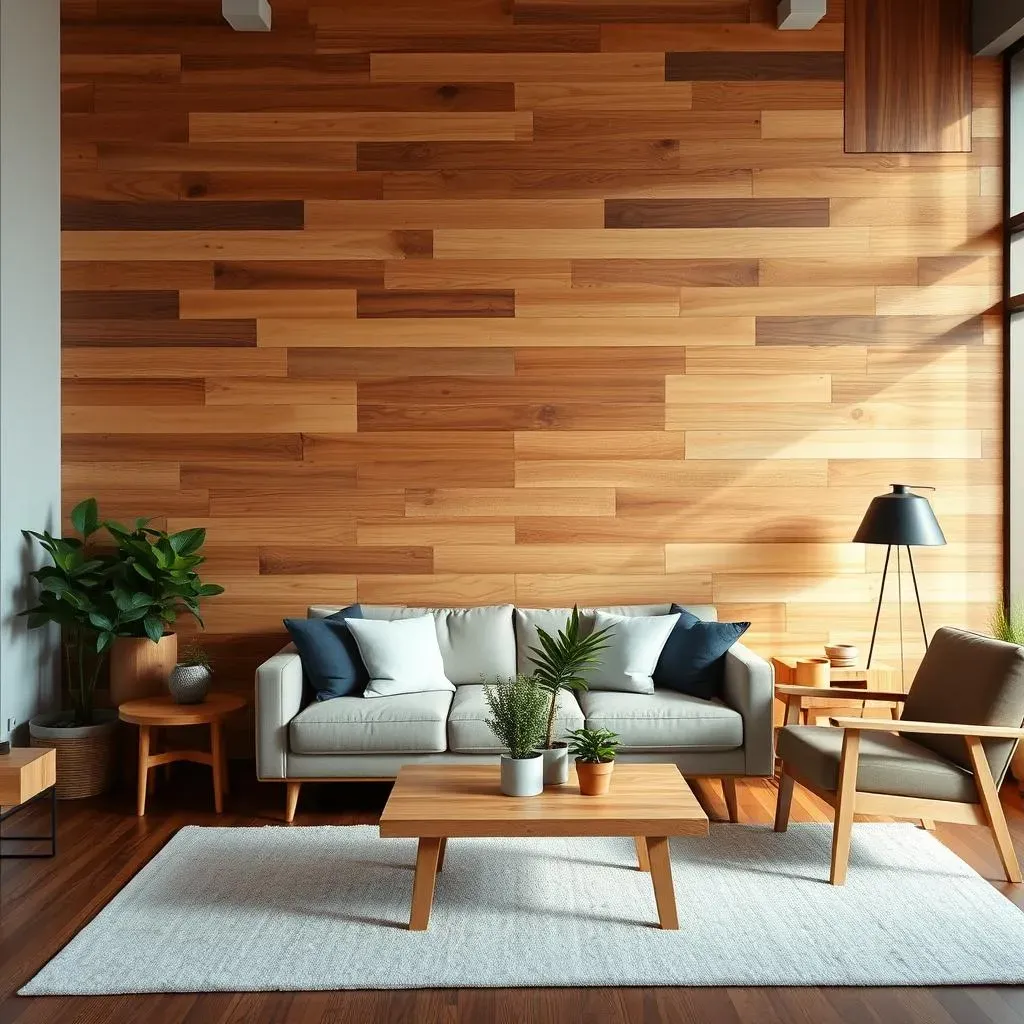Table of Contents
Tired of staring at the same old blank walls in your living room? Yearning for a touch of warmth, texture, and character? Look no further than the transformative power of wood accent walls in living room design. More than just a decorative feature, a carefully chosen and installed wood accent wall can redefine your space, creating a focal point that draws the eye and invites conversation.
Why Choose Wood Accent Walls for Your Living Room?
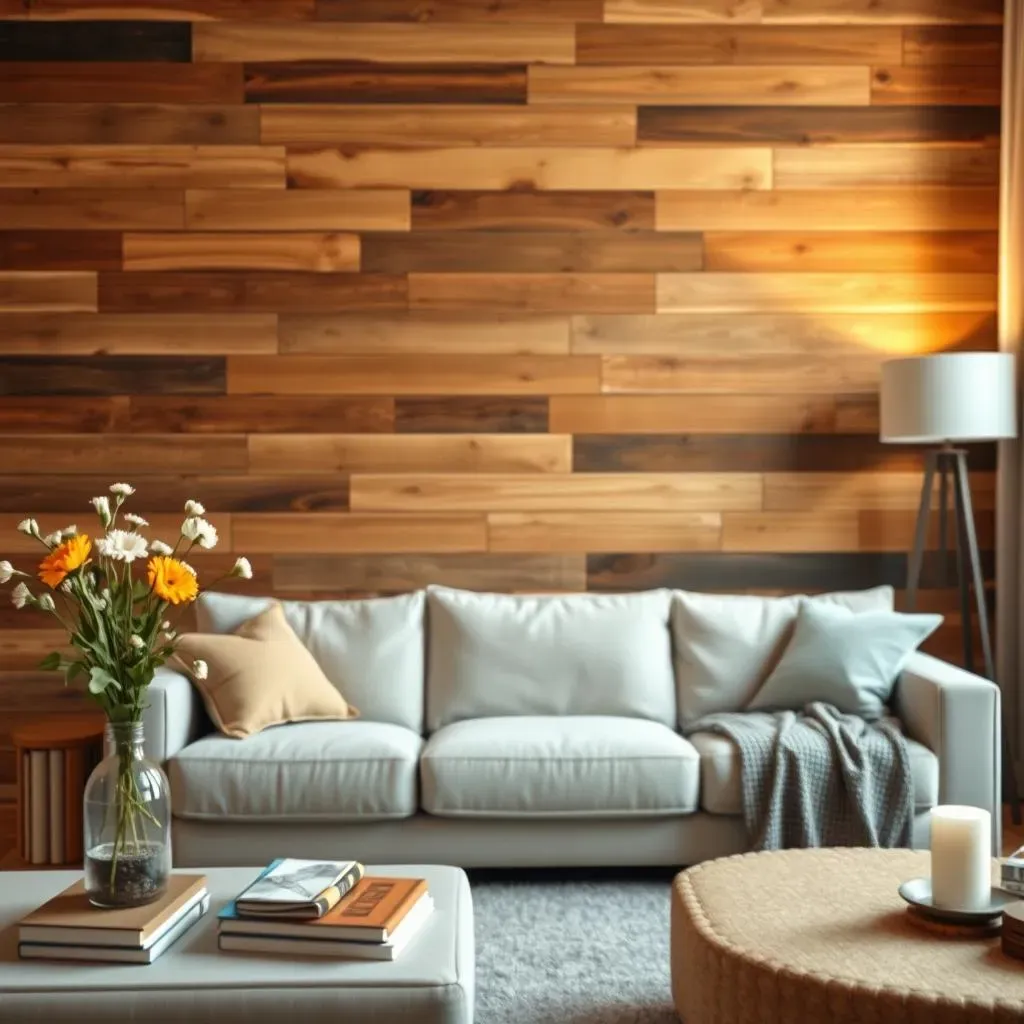
Why Choose Wood Accent Walls for Your Living Room?
Aesthetic Appeal and Versatility
Let's be real, a fresh coat of paint can only do so much. Wood accent walls bring a level of sophistication and visual interest that's hard to replicate. Whether you're aiming for a rustic farmhouse vibe, a sleek modern look, or something in between, wood offers incredible versatility. From the warm tones of reclaimed wood to the clean lines of shiplap, there's a wood accent wall to complement any design style. It’s like adding a piece of art, but one that covers an entire wall and sets the tone for the whole room.
Consider this: a dark-stained wood wall behind a light-colored sofa creates a striking contrast, instantly drawing the eye. Or, imagine a whitewashed shiplap wall in a coastal-themed living room, evoking the feeling of a breezy beach house. The possibilities are endless!
Adding Warmth and Texture
Beyond aesthetics, wood inherently brings warmth and texture to a space. Unlike cold, sterile walls, wood has a natural, organic feel that makes a room feel more inviting and comfortable. The texture of the wood grain adds depth and dimension, creating a tactile experience that engages the senses. Think about running your hand along a rough-hewn plank – it's a completely different sensation than touching a smooth, painted surface.
This warmth is especially valuable in living rooms, where you want to create a cozy and relaxing atmosphere. A wood accent wall can instantly transform a cold, impersonal space into a welcoming haven.
Increasing Home Value and Creating a Focal Point
Let's talk practicality. A well-designed wood accent wall can actually increase the value of your home. It's a feature that potential buyers will notice and appreciate, as it adds character and style to the space. Plus, it’s a relatively affordable way to make a big impact.
More than that, a wood accent wall naturally creates a focal point in the room. It draws the eye and anchors the space, making it feel more balanced and cohesive. This is particularly useful in open-concept living rooms, where you want to define different areas. By using a wood accent wall to highlight the seating area or entertainment center, you can create a clear and visually appealing distinction.
For instance, in my own living room, I used a reclaimed wood accent wall behind the TV. It instantly became the focal point, drawing the eye away from the less-attractive aspects of the room and creating a cozy, inviting atmosphere for movie nights.
Exploring Different Types of Wood for Your Living Room Accent Wall
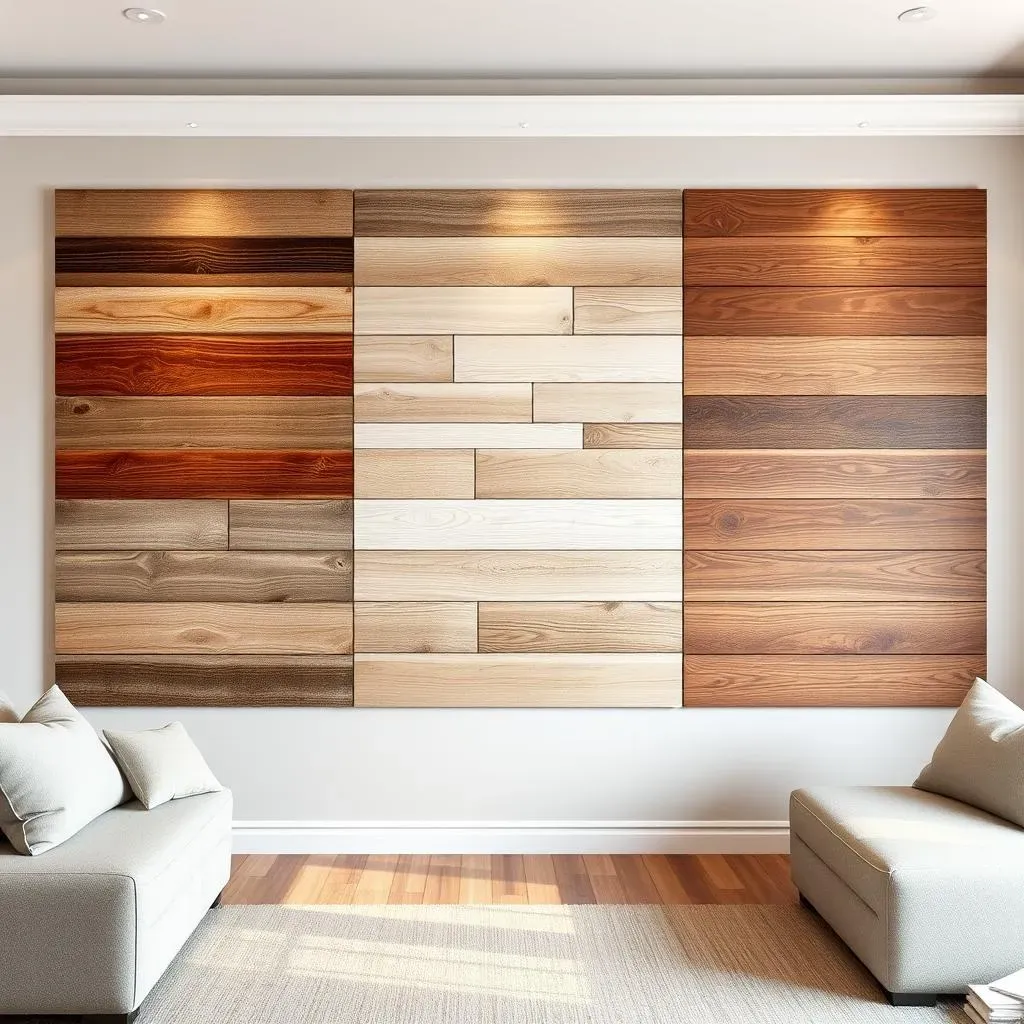
Exploring Different Types of Wood for Your Living Room Accent Wall
Reclaimed Wood: Rustic Charm and Sustainability
If you're after a unique, character-rich look, reclaimed wood is the way to go. Sourced from old barns, factories, and even deconstructed homes, reclaimed wood brings a sense of history and sustainability to your living room. Each plank tells a story, with its own unique grain patterns, nail holes, and weathering marks.
Reclaimed wood is perfect for creating a rustic or farmhouse-style accent wall, adding warmth and texture to the space. Plus, you can feel good about using a material that's been given a second life, reducing your environmental impact. However, keep in mind that reclaimed wood can be more expensive than other options, and it may require more preparation and sealing.
Shiplap: Coastal Vibes and Modern Simplicity
Shiplap has taken the design world by storm, and for good reason. This type of wood paneling consists of horizontal planks that overlap slightly, creating a distinctive grooved texture. Shiplap is incredibly versatile, working well in both coastal and modern settings.
It's relatively easy to install, making it a popular choice for DIY projects. You can paint it any color to match your decor, or leave it natural for a more rustic look. White shiplap is particularly popular for creating a bright and airy coastal vibe, while darker colors can add a touch of sophistication to a modern living room. Just be sure to properly seal the wood to prevent moisture damage, especially in humid climates.
Hardwood Planks: Elegance and Durability
For a more formal and elegant look, consider using hardwood planks for your accent wall. Options like oak, maple, and walnut offer rich colors and beautiful grain patterns that can elevate the style of your living room. Hardwood is also incredibly durable, ensuring that your accent wall will last for years to come.
You can install hardwood planks horizontally, vertically, or even in a herringbone pattern for a more dramatic effect. However, keep in mind that hardwood can be more expensive and difficult to install than other types of wood. You may need to hire a professional to ensure a flawless finish.
Wood Type | Style | Pros | Cons |
|---|---|---|---|
Reclaimed Wood | Rustic, Farmhouse | Unique character, sustainable | More expensive, requires preparation |
Shiplap | Coastal, Modern | Versatile, easy to install | Requires sealing |
Hardwood Planks | Elegant, Formal | Durable, beautiful grain | More expensive, difficult to install |
Design Ideas: Stunning Wood Accent Walls in Living Room Settings
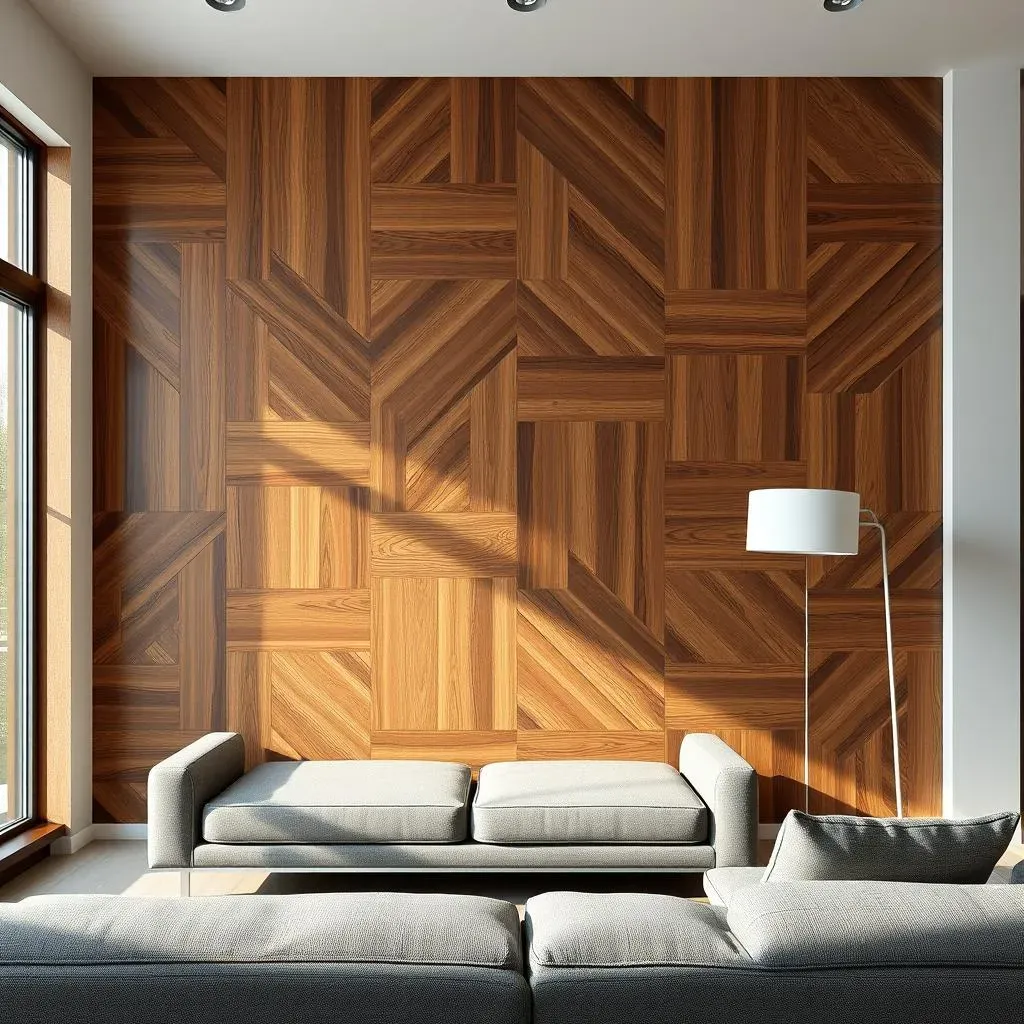
Design Ideas: Stunning Wood Accent Walls in Living Room Settings
Geometric Patterns: Modern Artistry
Feeling bold? A geometric wood accent wall can transform your living room into a modern art gallery. Think triangles, hexagons, or even more complex patterns created with different shades and textures of wood. This design is perfect for adding a contemporary edge to your space and creating a truly unique focal point.
You can achieve this look with individual wood pieces cut into geometric shapes and arranged on the wall, or by using pre-made geometric wood panels. Consider using contrasting wood stains to highlight the different shapes and add visual interest. Just be prepared for a bit of a challenge if you're tackling this as a DIY project – precise measurements and careful cutting are key!
Vertical Planks: Height and Drama
Want to make your living room feel taller and more spacious? Vertical wood planks are your secret weapon. By drawing the eye upwards, they create a sense of height and drama. This design works particularly well in rooms with lower ceilings.
You can use a variety of wood types and finishes to achieve different looks. Light-colored wood planks will create a bright and airy feel, while darker stains can add a touch of sophistication. Consider using planks of varying widths for added visual interest. And don't be afraid to get creative with the spacing between the planks – a wider gap can create a more modern, minimalist look.
Herringbone: Classic Elegance
For a touch of timeless elegance, consider a herringbone wood accent wall. This classic pattern, traditionally used in flooring, adds a sophisticated and visually appealing element to any living room. The herringbone pattern creates a sense of movement and texture, drawing the eye and adding depth to the space.
While this design may seem intimidating, it's actually quite achievable with a bit of patience and careful planning. You'll need to cut the wood planks at a 45-degree angle and arrange them in a repeating V-shape pattern. Consider using a jig to ensure consistent cuts and spacing. A herringbone wood accent wall is a surefire way to add a touch of luxury to your living room.
Design Idea | Style | Impact | DIY Difficulty |
|---|---|---|---|
Geometric Patterns | Modern, Contemporary | Unique, Artistic | Challenging |
Vertical Planks | Modern, Minimalist | Height, Spaciousness | Moderate |
Herringbone | Classic, Elegant | Sophistication, Texture | Moderate to Challenging |
DIY vs. Professional Installation of Wood Accent Walls
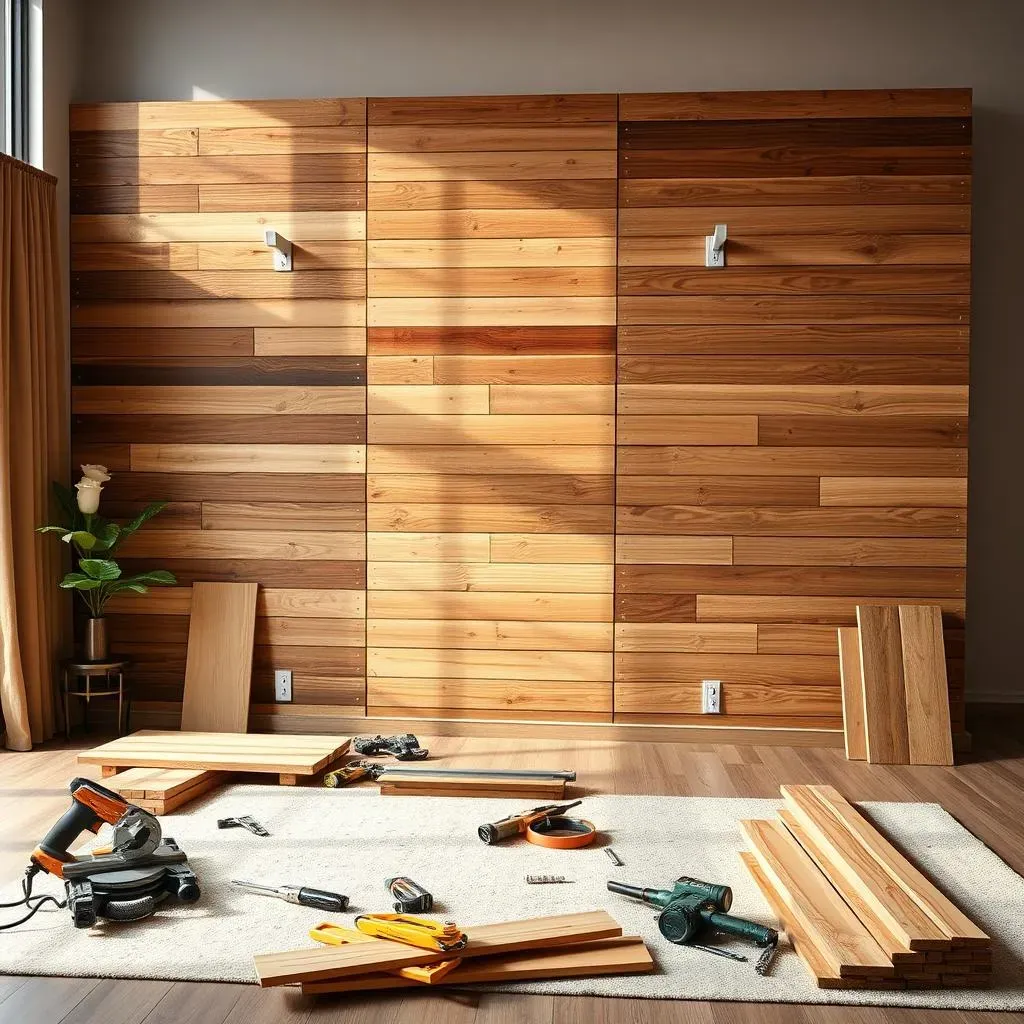
DIY vs. Professional Installation of Wood Accent Walls
Assessing Your Skills and Tools
so you're itching to get your hands dirty and tackle this wood accent wall project yourself? Awesome! But before you dive headfirst into a pile of lumber, let's take a realistic look at your skills and the tools you have on hand. Are you comfortable using power tools like a miter saw, nail gun, and level? Do you have experience with measuring, cutting, and installing wood? If you're a seasoned DIYer with a well-equipped workshop, then you might be ready to take on the challenge.
However, if you're a newbie to home improvement or lack the necessary tools, it might be wise to consider professional installation. Remember, a poorly installed accent wall can end up looking worse than no accent wall at all!
- Skill Level: Beginner, Intermediate, Advanced
- Tool Inventory: Miter saw, nail gun, level, measuring tape, stud finder, safety glasses
- Time Commitment: Do you have the time to dedicate to this project?
The Pros and Cons of DIY
So, you've assessed your skills and tools, and you're still leaning towards the DIY route? Let's weigh the pros and cons. The biggest advantage of DIY is, of course, the cost savings. You'll save a significant amount of money on labor costs, which can be a major factor for budget-conscious homeowners. Plus, there's a certain sense of satisfaction that comes with creating something beautiful with your own two hands.
However, DIY also comes with its challenges. It can be time-consuming, physically demanding, and require a steep learning curve. You'll need to invest time in researching techniques, watching tutorials, and potentially making mistakes along the way. And if you mess up, you'll be responsible for fixing it yourself, which could end up costing you more in the long run.
When to Call in the Pros
Alright, let's be honest, sometimes it's best to leave things to the professionals. If you're working with expensive materials like hardwood or reclaimed wood, or if you're attempting a complex design like a geometric pattern or herringbone, it's probably worth hiring a professional installer. They have the experience, expertise, and specialized tools to ensure a flawless finish.
Additionally, if you're short on time or simply don't enjoy DIY projects, hiring a professional can save you a lot of stress and hassle. They'll handle everything from measuring and cutting to installation and cleanup, leaving you with a beautiful accent wall without lifting a finger. While it will cost more upfront, the peace of mind and guaranteed quality may be well worth the investment.
Factor | DIY | Professional Installation |
|---|---|---|
Cost | Lower | Higher |
Time | More | Less |
Skill Required | Higher | Lower |
Quality | Variable | Guaranteed |
Maintaining and Styling Your Wood Accent Wall in the Living Room
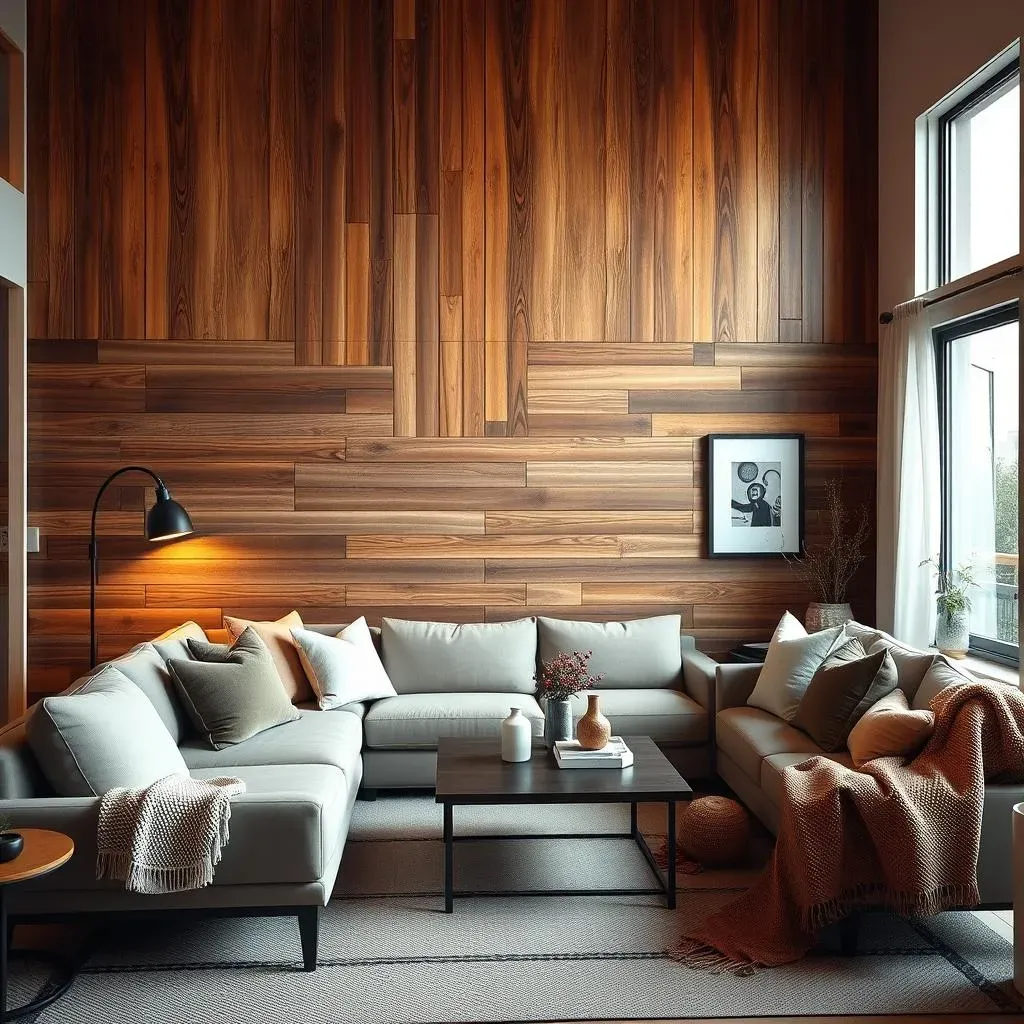
Maintaining and Styling Your Wood Accent Wall in the Living Room
Regular Cleaning: Keeping the Dust at Bay
Alright, you've got your stunning wood accent wall in the living room, now let's talk about keeping it looking its best! Regular cleaning is key, and it's way easier than you might think. Dust is the enemy here, as it can dull the wood's natural beauty over time. Grab a soft cloth or a duster and give your accent wall a gentle once-over every week or two.
For deeper cleaning, you can use a mild soap and water solution. Just make sure to wring out the cloth thoroughly so it's only slightly damp – you don't want to soak the wood! Gently wipe down the surface, then dry it with a clean, dry cloth. Avoid using harsh chemicals or abrasive cleaners, as these can damage the finish.
Styling Tips: Complementing Your Wood Accent Wall
Now for the fun part: styling! Your wood accent wall is the perfect backdrop for showcasing your personal style. Think about how you can use furniture, decor, and lighting to complement the wood's natural beauty. For example, if you have a rustic reclaimed wood wall, consider adding some vintage-inspired furniture and warm, Edison-style lighting.
On the other hand, if you have a sleek, modern shiplap wall, opt for minimalist furniture and cool-toned lighting. Don't be afraid to experiment with different textures and colors to create a look that's uniquely yours. Throw pillows, blankets, and artwork can all add personality and visual interest to your living room.
Maintenance Task | Frequency | Tools/Materials |
|---|---|---|
Dusting | Weekly/Bi-weekly | Soft cloth or duster |
Deep Cleaning | As needed | Mild soap, water, soft cloth, dry cloth |
Styling | Ongoing | Furniture, decor, lighting |
Embrace the Warmth: Your Wood Accent Wall Journey Doesn't End Here
As we've explored, wood accent walls in living room design offer a fantastic way to inject personality, warmth, and style into your home. From rustic shiplap to sleek, modern panels, the possibilities are as diverse as your imagination. Whether you choose to tackle a DIY project or enlist the help of professionals, the key is to select the right wood, design, and finish that complements your existing décor and reflects your unique taste. Remember, your wood accent wall is more than just a visual element; it's a statement piece that can transform your living room into a cozy and inviting space for years to come. So, go ahead, embrace the beauty of wood, and create a living room you'll love to call your own.
